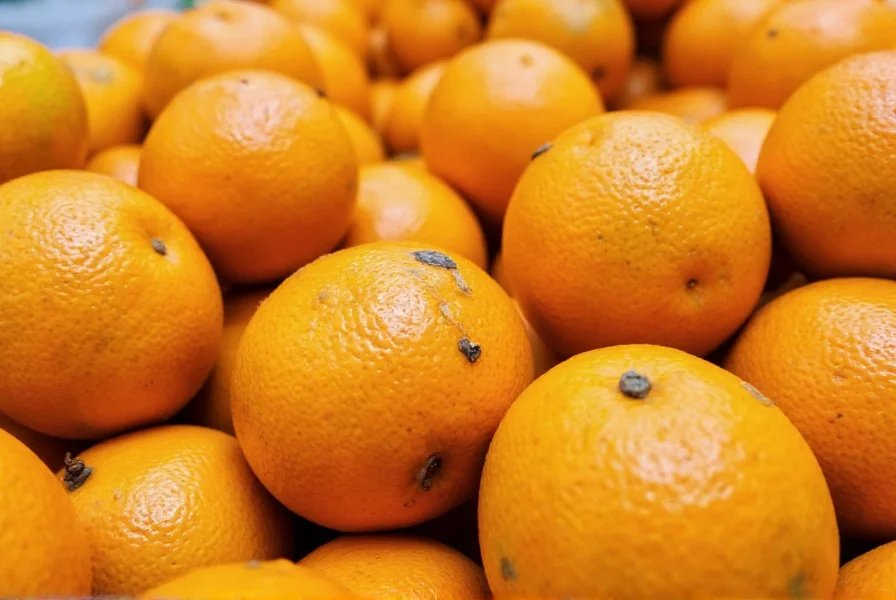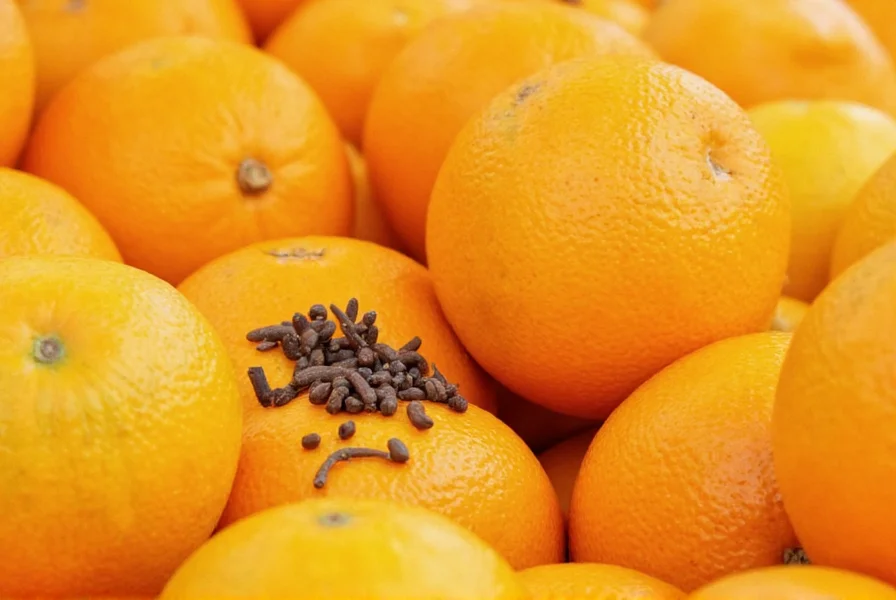For centuries, the practice of embedding whole cloves into oranges has been cherished across cultures for its delightful fragrance and symbolic meaning. This timeless tradition, known as creating a pomander, transforms simple kitchen ingredients into elegant decorations with surprising versatility. Whether you're exploring holiday customs, seeking natural home fragrances, or curious about historical food preservation methods, understanding cloves in oranges reveals a fascinating intersection of culture, practicality, and sensory pleasure.
The Historical Significance of Clove-Studded Oranges
The tradition of pomanders (from the French "pomme d'ambre," meaning apple of amber) dates back to medieval Europe when people carried fragrant balls to ward off illness during plague outbreaks. Oranges studded with cloves evolved from these early protective amulets. During the 16th and 17th centuries, these fragrant orbs became status symbols among European aristocracy, often hung from chains or displayed in homes to freshen the air and demonstrate wealth, as both oranges and cloves were expensive imports.
By the Victorian era, clove-studded oranges became associated with Christmas traditions, particularly in England and Germany. Families would create them together as holiday decorations, hanging them on trees or placing them in bowls around the home. This practice spread to America through European immigrants, becoming a beloved seasonal activity that continues today as a nostalgic craft project.
Practical Applications of Cloves in Oranges
Modern uses for clove-studded oranges extend beyond mere decoration. Understanding how to make clove studded oranges properly unlocks several practical benefits:
| Application | Duration | Effectiveness |
|---|---|---|
| Natural air freshener | 4-8 weeks | ★★★★☆ |
| Holiday decoration | Seasonal (3-4 weeks) | ★★★★★ |
| Culinary ingredient | During cooking only | ★★★☆☆ |
| Closet freshener | 2-3 months | ★★★★☆ |
As a natural air freshening solution, cloves in oranges provide chemical-free fragrance that gradually intensifies as the orange dries. The essential oils from both ingredients combine to create a complex scent profile that many find more appealing than artificial air fresheners. For those interested in using oranges and cloves for air freshening, the process requires no special equipment and produces zero waste.
Creating the Perfect Clove-Orange Pomander
While the concept seems simple, achieving optimal results with clove orange pomander recipe techniques requires attention to detail:
- Select firm, blemish-free oranges (navel oranges work best)
- Wash and thoroughly dry the fruit
- Begin studding cloves at the stem end, working in a spiral pattern
- Space cloves approximately 1/4 inch apart for best fragrance distribution
- Continue until the entire surface is covered
- Allow to dry in a cool, dark place for 1-2 weeks
For enhanced fragrance, some traditions recommend rolling the finished pomander in a mixture of ground cinnamon, nutmeg, and allspice. The drying process concentrates the essential oils, creating a stronger, longer-lasting scent. Properly made, these natural decorations can fragrance a room for several weeks and serve as attractive holiday ornaments.

The Science Behind the Fragrance Combination
The enduring popularity of cloves in oranges isn't merely tradition—it's rooted in chemistry. Oranges contain limonene, a compound responsible for their characteristic citrus scent, while cloves contain eugenol, which provides their distinctive spicy aroma. When combined, these compounds interact to create a more complex fragrance profile that many find psychologically uplifting.
Research shows that citrus scents can improve mood and alertness, while clove's warm spice notes create a sense of comfort. This explains why the combination has remained popular for traditional holiday decorations with cloves and oranges. The natural drying process slowly releases these compounds, providing a gradual, long-lasting fragrance without the sudden intensity of artificial sprays.
Common Misconceptions Addressed
Despite its popularity, several myths surround cloves in oranges. While some claim significant health benefits from benefits of cloves in oranges, scientific evidence for therapeutic effects is limited. The fragrance may provide mild mood enhancement, but it doesn't purify air or prevent illness as historical traditions once believed.
Another misconception involves preservation. Some believe studding oranges with cloves preserves them indefinitely, but in reality, the fruit will eventually mold or dry completely. Properly dried pomanders become hard and brittle but maintain their fragrance for months when stored in cool, dry conditions.
Modern Adaptations and Variations
Contemporary crafters have expanded the traditional history of clove oranges tradition with creative variations:
- Using clementines or tangerines for smaller pomanders
- Adding decorative ribbons or lace for gift presentations
- Combining with other dried fruits like apples or lemons
- Creating pomander balls usingscrição technique with fabric
- Incorporating into wreaths and other seasonal arrangements
For culinary applications, chefs sometimes use clove-studded oranges in braising liquids for meats or as flavor infusions for beverages. The what is the purpose of putting cloves in oranges for cooking differs from decorative uses—typically, the orange is cut rather than studded, allowing flavors to infuse more directly into dishes.
Environmental and Economic Considerations
Choosing natural fragrance solutions like cloves in oranges offers several advantages over commercial products. A single orange and small jar of cloves costs significantly less than multiple air fresheners while producing no plastic waste. The ingredients are completely biodegradable, making this practice environmentally friendly.
For those exploring sustainable living practices, this traditional method represents a zero-waste approach to home fragrance. When the pomander has finished its useful life, both components can be composted, completing the natural cycle without contributing to landfill waste.
Frequently Asked Questions
How long do clove-studded oranges last as air fresheners?
Properly prepared clove-studded oranges typically remain fragrant for 4-8 weeks as air fresheners. The scent intensifies during the first two weeks as the orange dries, then gradually diminishes. Hanging them in a cool, dark place extends their effectiveness, while direct sunlight or heat sources will cause them to dry too quickly and lose fragrance sooner.
Can I eat an orange after studding it with cloves?
While technically safe to eat, oranges studded with cloves are generally not consumed after decoration. The cloves penetrate the fruit's surface, making the flesh bitter, and the drying process concentrates any pesticides or waxes on the peel. For culinary uses, chefs typically stud oranges temporarily during cooking then remove them before serving, rather than creating permanent decorative pomanders.
Why do cloves in oranges become hard over time?
The hardening occurs as the orange's moisture evaporates during the drying process. As the fruit dehydrates, it shrinks and becomes firm while concentrating the essential oils that create the fragrance. This natural preservation method allows the pomander to maintain its scent for weeks. The cloves remain intact throughout this process, continuing to release their aroma as the dried citrus provides a stable base.
What's the best way to store clove-studded oranges when not in use?
For optimal preservation, store clove-studded oranges in an airtight container in a cool, dark place when not actively fragrance. Some people wrap them in breathable fabric like muslin before storage. Avoid refrigeration, as moisture can cause mold. Properly stored pomanders can maintain their fragrance for several months and be brought out for special occasions as needed.
Are there alternatives to oranges for making pomanders?
Yes, many fruits work well for pomanders. Apples, lemons, limes, and even onions can be used, though each produces a different fragrance profile. Apples create a sweeter scent, while lemons offer a brighter citrus aroma. Some crafters use carved wooden balls as permanent bases that can be reused year after year with fresh cloves. Dried citrus slices also make attractive alternatives for those seeking a flatter decorative element.











 浙公网安备
33010002000092号
浙公网安备
33010002000092号 浙B2-20120091-4
浙B2-20120091-4